- Home
- Jessie Haas
Shaper
Shaper Read online
Shaper
Jessie Haas
CHAPTER
1
HE DID NOT belong with them.
The vacation at the lake had proved this again, and every mile down the highway toward home reinforced it.
He couldn’t go sit at a different picnic table, though. Sky would want to come with him. If he menaced Sky, Mom would shout, “Chad! For Pete’s sake, be nice to him! You were four once, too, you know!”
Gib wouldn’t say anything, just eat and grin, looking more like a teenager gone slightly stale than a husband and father. But Julia would say, loud enough to be heard across the interstate, “Four, fourteen—big difference!”
So best drift casually away, sandwich in hand, and pretend to study the rest area map. It stood apart under its own shingled roof, and Chad stood apart with it, stood apart in his clean white T-shirt—
He glanced down, his hand tightened, and mustard shot out of the ham sandwich. It made a chrome yellow splash down his chest.
“No!” He had only three shirts he could bring himself to wear, three blanks remaining from the failed family tie-dye business. He couldn’t afford a mustard stain.
He took a step toward the bathroom and remembered the sandwich. If he took it in there, he’d never feel the same about it.
At the picnic table a shriek went up. Sky jerked his sandwich high in the air. It disintegrated in his little fat hand, and Queenie gulped at falling bread and ham. “Queenie, no!” Mom and Julia shouted, and Gib sat back, laughing.
The colors seemed to flare with the noise: Kool-Aid, Day-Glo, neon tie-dye. Every single member of his family wore some piece of liquidated Rainbow People inventory, and there was no way. Walk over there in his streaked white shirt and have Gib say, “Chad likes to dye things gradually”? Connect himself with them in the eyes of the old couple, the fat tourist family, the guy at the wheel of the yellow rental truck that had just pulled in off the highway?
No way. He wrapped his sandwich in its waxed paper bag and left it tucked in a corner of the map frame.
When he came back from the bathroom, he was yellow stained and wet. Bleach, he was thinking, as he reached for the sandwich. Bleach might work. Two shirts were not enough—
A car door slammed. Chad’s hand jerked back from the sandwich, as if he’d been caught stealing.
But that was stupid. He wrapped the bag around the bottom of the sandwich and took a bite, bending forward so any remaining mustard would splurt onto the ground.
The rental-truck driver came to study the map. Despite the heat, his khaki pants were crisp and pressed, and his knit shirt didn’t stick to his back. Air-conditioned cab, Chad thought. But the man looked as if, no matter what, he’d always seem cooler than other people. He had a paper in his hand, and he glanced from it to the map, then reached out to trace a route from Exit 6, Chad’s exit, off into the hills west of Barrett. Heading my way, Chad thought, but he offered no help. He wasn’t good at directions, and he wasn’t good at strangers.
The man turned from the map now, with a passing glance at Chad’s sandwich. It must smell wonderful to him: home-raised, home-killed, home-cured ham—
Shouts gusted up from the picnic table: “Queen!”; “Queenie!”; “Hey, Gib, get her!”
Queenie trotted across the asphalt, toward the other picnic tables and the lane where the big trucks rolled in. Toward the interstate. Her golden ears didn’t even twitch at all the voices shouting her name.
Out on the highway truck brakes whooshed. A big engine geared down to swoop into the rest area. Chad felt a jolt deep in his body, as if he’d started to move and then didn’t, as if his insides had run into his outsides. The man beside him took a fast step in Queenie’s direction.
But Gib crossed the tar in long strides. He nabbed Queenie just as she reached the truck lane. “Idiot!” Chad heard him say, before the incoming semi drowned his voice. He led her back, not reaching his arm down far enough. Queenie’s neck was stretched high, and at every step Gib seemed to stretch it a little more. The man at the map made a sound under his breath, and his gaze crossed Chad’s.
“People like that shouldn’t be allowed to have a dog!”
Chad didn’t answer.
The man went back to his rental truck. Get in, Chad thought. Drive away. But the man got a sandwich and a thermos bottle and sat at a picnic table, frowning across at Chad’s family.
Mom and Gib packed up. Sky had Queenie’s collar in both hands. “No, Queenie! No!” he shouted, while she sat panting tolerantly. On the way to the van, though, Sky let go.
Gib grabbed Queenie and hauled her into the vehicle. “Now stay there!”
Chad sauntered toward the van before anyone could yell for him. He’d just disappear behind it and never come out the other side. No one would notice. He slid past the computer box and pushed Queenie’s tail out of his face. The tail was one more thing he had against her; Shep hadn’t had a tail. He reached his seat by the back left window and looked out. His eyes met the eyes of the rental-truck man.
The man’s eyes widened. His face lengthened in surprise. Then he nodded to Chad, just once. Chad looked away, feeling the heat in his face. Only when the van was in motion did he look out the window again.
The man crushed his sandwich wrapper into a ball and looked down at his hand. He’d gotten something on it, mustard or mayo.
He’d go wash, and then he’d drive down the interstate, take Exit 6, turn right at the bottom of the ramp, follow them up into the hills.
There were lots of hills and lots of people living in them. Chad didn’t see many of them, fewer all the time.
CHAPTER
2
AT HOME GIB set up the new computer. Mom stood over him, starting questions and biting them off. “What?” Gib kept saying. “What?”
“Snack! I want SNACK! IT’S SNACK TIME!” Sky yelled, in a voice that could melt the tar off the roof. Mom ignored him. It amazed Chad how long she could let a sound like that go on.
It was Julia who finally cracked. “There! PB and J! Are you happy?”
All of them were occupied. Chad slipped quietly out the door. On the deck Queenie wagged her tail. Chad made a fierce gesture at her. “You stay!” The moment he started down the stairs, he heard her follow.
He headed down the dirt road, hands jammed in his pockets. Queenie hunted chipmunks along the stone wall, sometimes ahead of him, sometimes behind.
Something was bothering him, something extra. What?
The rest area. The man. He felt strange about it, as if he’d done something wrong. But he hadn’t done anything. Anything at all.
On the road below he heard a truck, Jeep’s pickup. He knew that engine’s sound. He deliberately didn’t call Queenie.
She reared up on the stone wall like a golden wolf as the pickup came into sight, then scrambled down into the road. The truck kept coming, and Chad held himself still. He made himself look right at his grandfather, the square, hard face beneath the hatbrim, behind the wheel. See? See?
The big tires swerved just a little, just enough. Jeep raised his hand in that stiff way that was not even as lively as a salute and passed. Ginger, his Border collie, rested her chin on Jeep’s shoulder and gazed out the back window at them. Her face, beneath the rifle in the gun rack, looked bored and superior.
Watch out, Ginger! Your time will come!
No more cars would pass. It was Saturday. No delivery trucks would drop off supplies or pick up orders from his parents’ new energy-efficient lightbulb business. Jeep and Helen’s was the only house beyond theirs, and they wouldn’t have visitors, because tonight was the fire department’s strawberry supper. The house near the bottom of the hill, the old white Cape, was still empty.
No, it wasn’t. As Chad came around the corner, he saw
yellow between the big maple trunks: rental truck yellow.
It was a lot worse than coincidence. It was fate that the man setting up two-by-fours to make a skid from the back door of the truck to the front door of the house was the man from the rest area.
Queenie’s tail waved. In a moment she was under the two-by-fours, tangled in the man’s legs. Chad didn’t call her. One part of the earlier scene he was not going to repeat was the shouting. The man started and frowned at Queenie and then looked up.
“Oh! Hello. D’you mind—”
“I’ll take her home,” Chad said.
“No, I meant … would you mind very much just helping me in with my stove? It’s the kind of thing you think you can do by yourself until you’re actually faced with—oh.”
He looked inside the house, following Queenie’s disappearing tail. Chad could hear her claws clatter on bare wood. She’s not really my dog, he wanted to say. I don’t even like her. He heard her climbing stairs.
The man got into the back of the truck and hopped out a moment later with a leash in his hand. He whistled sharply: once, twice, three times. Chad heard a scrabble and thump inside the house. Then Queenie popped her head out the doorway, one ear up and one ear down.
The man fed her something and without haste clipped the leash to her collar. He lowered his closed fist toward the ground, and Queenie, intent now, followed it. He fed her again and handed the leash to Chad.
“Tie her to that bush, if you would.”
“She’ll yell.”
“Yes, I expect she—oh!” The man smiled suddenly and shook his head. “I haven’t introduced myself, and you haven’t said yes. I’m David Burton, just bought this place. And you’re …”
“Chad. Chad Holloway. I—we live up the road.”
“And we met earlier today, didn’t we? At the rest area. After what I said then, I don’t deserve your help, but I’m glad for the chance to apologize.”
Chad’s ears felt hot. “It’s okay.” He dragged Queenie to the bush and tied her. As he walked away, she began to yelp, then to make that raving sound, like a pig being slaughtered.
David Burton didn’t seem to mind. He’d maneuvered his stove to the top of the skids, and he and Chad slid it down into the front hall. Stairs rose in front of them. There were rooms to the left and right. Beyond the left-hand room was a second, and that was where they took the stove, skinning their knuckles on the doorways, sweating.
“Thank you!” David said. “Can I offer you—” He looked around the big, empty kitchen. “No refrigerator. No glasses. You’re welcome to stick your head under the tap!”
“What about the refrigerator?”
David stood completely still, as if struck with a new thought. “What, as you so astutely remark, Mr.—Mr.…?”
“Holloway.”
“Mr. Holloway, what about the refrigerator? Are you by any chance offering?”
“Well, I don’t see how you can do it by yourself!” The empty room pleased Chad, and he liked the way David Burton was coming to life. The effort of pushing the stove had brought color to his face. How old was he? Older than Gib, not as old as Jeep …
“I did imagine—that dog has solid brass windpipes!—I did once imagine that my daughter and I could move the refrigerator together. Having moved the stove, I now see—in short, please!”
They went back outside. Queenie achieved a new, poignant pitch. “Quiet!” Chad shouted. “Queenie!”
David Burton lifted one hand, somehow quieting Chad, though it had no effect on Queenie. “Save your breath,” he said. They looked into the truck.
A forest of chair and table legs; dark, solid shapes of larger furniture; boxes, baskets, milk crates; beyond them all, the tall white shape of the refrigerator. David met Chad’s eyes.
“Why, you’re wondering, is the fridge in the front of the truck, when the stove was in the back? An excellent question! If you’d like to come back in two or three hours, I’ll be in a position to benefit from your assistance.”
Chad shrugged. “Let’s just do it.”
“All of it? That’s too much! You’ll have to let me pay you.”
Chad liked the fairness, but Mom wouldn’t go for that. You didn’t take pay for helping a neighbor. He shook his head.
“Barter?”
“Like what?”
“I could help you train your dog.”
Chad looked over at Queenie. Mistake. Her shrieks gained new strength and piercingness. “She’s not really my dog. My dog—” His throat closed, husking his voice. Still, still, he couldn’t talk about Shep.
“Would your life be easier—” David said. He was interrupted by rapid hoofbeats on the road. Chad stepped back, behind the open door of the truck.
“Chad? Chad! What’s going on?” Gravel crunched under steel-shod hooves. Tiger whooshed his breath.
Julia. Julia in her orange sports bra top and tie-dyed leggings, her purple suede chaps with the flying fringes, her helmet with its black-and-pink polka-dotted cover. Tiger foamed at the bit, danced, whirled. “Hey, mister, that’s my dog! Where’s—”
Chad stepped out from the shelter of the door.
“What’s going on? She’s been yelping for twenty minutes. We thought you were cornered by a bear or something!”
“You sure would have scared it off!” Chad muttered. Julia didn’t hear.
“So you’re the new owner? I’m—whoa, Tiger!” Another whirl: Tiger’s mane and Julia’s purple fringes flew. “Sorry, he doesn’t like trucks. I’m Julia Holloway, Chad’s big sister. We live up the road.”
“David Burton.” David seemed colorless again. Everyone did next to Julia. He said, “If I untie this dog, do you suppose she’ll follow you home?”
“If I gallop. But can’t—”
“Thank you,” David said. He crossed the lawn before Julia could finish, unclipped Queenie, and lifted his hand in a farewell wave. “Nice meeting you. Thanks for coming to the rescue.”
Julia looked baffled. She wanted to stay, Chad knew, to pry. But David’s hand was still up, waving good-bye, and already Queenie was starting to wander.
“Well, nice to meet you. Queenie, come on!” Tiger sprang away from the hated truck in a spray of sod, and Queenie lunged after him. The hoofbeats clattered away up the hill, and the yard became very quiet.
“The dog belongs to your sister?”
“No, she’s—” Why? Why couldn’t he ever get away from them? “She’s the family dog,” he said. “I don’t want to train her.”
“Are you sure? Because I don’t have much else to trade. I’m no gardener; there aren’t going to be any bushels of zucchini coming up the hill.”
Chad reached deep, for an answer that would end this talk and get them moving furniture, get them inside the empty, quiet house again. “The zucchini will be coming down the hill. That’s what you can do for me: promise to take the zucchini!” He reached into the truck for a chair, and to his relief David did the same.
CHAPTER
3
“THIS IS TOO much for us,” David said.
The refrigerator loomed at the top of the ramp like a vast beached whale. They’d walked it back, rocking from corner to corner to corner, then tipped it on its side. The truck springs still jounced, and the metal sides rang faintly. The slope to the door looked long and steep and terrifying. Chad felt too young to move a refrigerator after all, too small.
He shrugged. “We can do it.”
“I don’t think I ought to let you.”
“It can’t hurt us,” Chad said. He wasn’t sure that was true. “We’ll stay outside the two-by-fours, so we can’t get pinned.”
David shook his head and stood frowning at the refrigerator. “If we had a rope to hold it back … but what would we—”
“Like a hand?”
The voice came from out in the late-afternoon sunshine. Jeep, of course. Jeep in his green work pants and fire department T-shirt. Jeep’s face was dark like carved wood, square and clean-s
haven. The bill of his cap was pulled low over glasses that tinted brown in bright light. It was impossible to know which of them he was really looking at.
Beside him stood Helen, small and neat in her skirt and flowered blouse, looking young for a grandmother. She held a loaf of bread. “Welcome, neighbor! We’re the Houghtons.”
“Oh, like the road! This is Houghton Hill Road, right?”
“That’s right,” Jeep said.
David hopped down from the truck. “David Burton.” He shook Jeep’s hand—hard as a hoof, that hand, rough and rasping as a file. “Did I hear you offer—”
Somehow talking to Jeep made David’s voice jumpy and cricketlike, and somehow that made Jeep smile, a narrow gleam of white, even dentures, like a flash of sun on a cloudy day.
“That’s what you heard. You take that side, and when we holler ‘ready,’ Chad’ll give ’er a shove.”
That was artfully done. He didn’t speak directly to Chad, so there was no need to answer, or to not answer and rouse David’s curiosity. At the signal Chad leaned hard against the refrigerator. It surged away from him down the skid with Jeep and David bracing against the front end. A gulf of empty air widened behind it.
Jeep and David upended the refrigerator through the door. Chad heard its lumbering progress. He watched Helen peek into the right-hand room and up the stairs, then follow the men. Voices, laughter. Jeep laughing, bringing to mind those gleaming, even teeth, those false teeth, and Mom telling of the agony when, thirty-two years old, Jeep had every one of his rotting natural teeth pulled in a single afternoon. It was the only time she ever saw him drunk, and he stayed drunk for three days, trying to dull the pain.
That was a long time ago now. Jeep had the smile of a movie star, and something about David Burton warmed him to laugh, even.
Chad didn’t stay to find out what. He let himself down from the back of the truck and walked home.
Later Chad lay on his bed, feeling the long muscles down his spine get rigid and achy from hard work. The television tried to outshout a radio program on the new computer. Sky played some wild game, thumping open the sliding glass door, racing down the deck that half surrounded the house, bursting in the front door. Mom shouted, “Don’t run!” twice a minute. The deck was a full story off the ground, and running was forbidden, or at least she kept forbidding it.

 Chase
Chase The Sixth Sense
The Sixth Sense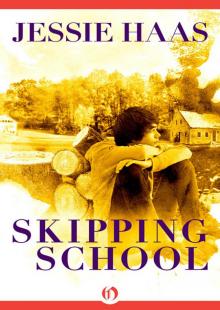 Skipping School
Skipping School Keeping Barney
Keeping Barney Unbroken
Unbroken Westminster West
Westminster West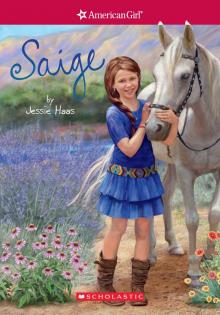 Saige
Saige Beware the Mare
Beware the Mare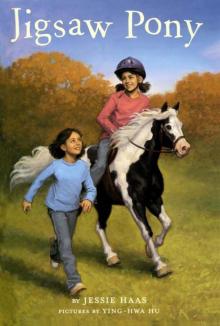 Jigsaw Pony
Jigsaw Pony Rescue
Rescue Saige Paints the Sky
Saige Paints the Sky Beware and Stogie
Beware and Stogie Chico's Challenge
Chico's Challenge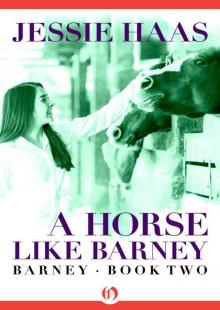 A Horse like Barney
A Horse like Barney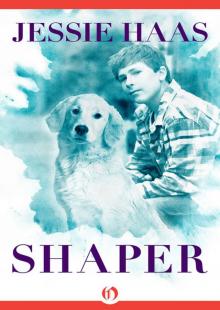 Shaper
Shaper Be Well, Beware
Be Well, Beware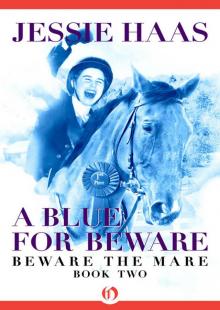 A Blue for Beware
A Blue for Beware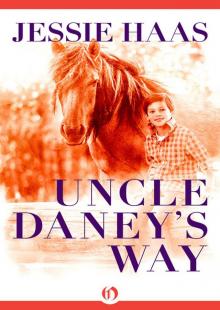 Uncle Daney's Way
Uncle Daney's Way